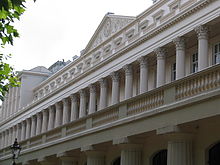
Back Information Research Department French Information Research Department Italian 情報調査局 Japanese Information Research Department Portuguese Департамент информационных исследований Russian 信息调查部 Chinese
 Carlton House Terrace, the original home of the Information Research Department's propaganda activities | |
| Agency overview | |
|---|---|
| Formed | 1948 |
| Dissolved | 1977 |
| Jurisdiction | United Kingdom |
| Employees | Estimated 400-600 at height.[1] |
| Parent agency | Foreign Office |
The Information Research Department (IRD) was a secret Cold War propaganda department of the British Foreign Office, created to publish anti-communist propaganda, including black propaganda,[2] provide support and information to anti-communist politicians, academics, and writers, and to use weaponised information, but also disinformation and "fake news", to attack not only its original targets but also certain socialists and anti-colonial movements.[1][3] Soon after its creation, the IRD broke away from focusing solely on Soviet matters and began to publish pro-colonial propaganda intended to suppress pro-independence revolutions in Asia, Africa, Ireland, and the Middle East. The IRD was heavily involved in the publishing of books, newspapers, leaflets and journals, and even created publishing houses to act as propaganda fronts, such as Ampersand Limited.[4] Operating for 29 years, the IRD is known as the longest-running covert government propaganda department in British history, the largest branch of the Foreign Office,[5] and the first major anglophone propaganda offensive against the USSR since the end of World War II. By the 1970s, the IRD was performing military intelligence tasks for the British Military in Northern Ireland during The Troubles.[6]
The IRD promoted works by many presumably anti-communist authors including George Orwell,[7][8][9] Arthur Koestler, Bertrand Russell, and Robert Conquest.
Internationally, the IRD took part in many historic events, including Britain's entry into the European Economic Community,[10] the Korean War,[10] the Suez Crisis,[11] the Malayan Emergency,[12] The Troubles,[6] the Mau Mau Uprising,[13] Cyprus Emergency,[14] and the Sino-Indian War.[15][16] Other IRD activities included forging letters and posters,[1] conducting smear attacks against British trade unionists, and attacking opponents of the British military by planting fake news stories in the British press. Some of the fabricated stories the IRD created included accusations that Irish republicans were killing dogs by setting them on fire[6] and falsely accusing EOKA members of raping schoolgirls.[14]
Although the existence of the IRD was successfully kept hidden from the British public until the 1970s, the Soviet Union had always been aware of its existence, for Guy Burgess had been posted to the IRD for a period of two months in 1948.[17] Burgess was later sacked by the IRD's founder Christopher Mayhew, who accused him of being "dirty, drunk and idle".[18] The IRD closed its operations in 1977 after its existence was discovered by British journalists after an investigation into a heavy amount of anti-Soviet propaganda being published by academics belonging to St Antony's College, Oxford.[19] An exposé by David Leigh published in The Guardian, entitled "Death of the Department that Never Was", became the first public acknowledgement of the IRD's existence.[18]
- ^ a b c Berg 2019.
- ^ Burke, Jason (14 May 2022). "Secret British 'black propaganda' campaign targeted cold war enemies". the Guardian.
- ^ Sinclair 2021.
- ^ Wilford 1998, p. 366.
- ^ Cobain 2018.
- ^ a b c Rory 2016, p. 1094.
- ^ Rubin 2012, p. 40-42.
- ^ Dunton 2020.
- ^ Shaw, Tony (22 September 2011). "Making a pig's ear of Orwell". The Independent. Retrieved 14 January 2021.
- ^ a b Defty 2005, p. 4.
- ^ Lashmar & Oliver 1988, p. 68.
- ^ Blotch & Fitzgerald 1983, p. 93.
- ^ Lashmar & Oliver 1988, p. 88.
- ^ a b Dorril 2002, p. 552.
- ^ McGarr 2017.
- ^ Defty 2005, p. 17.
- ^ Lashmar & Oliver 1988, p. 37-8.
- ^ a b Leigh 1978.
- ^ Lashmar & Oliver 1988, p. 1.
© MMXXIII Rich X Search. We shall prevail. All rights reserved. Rich X Search